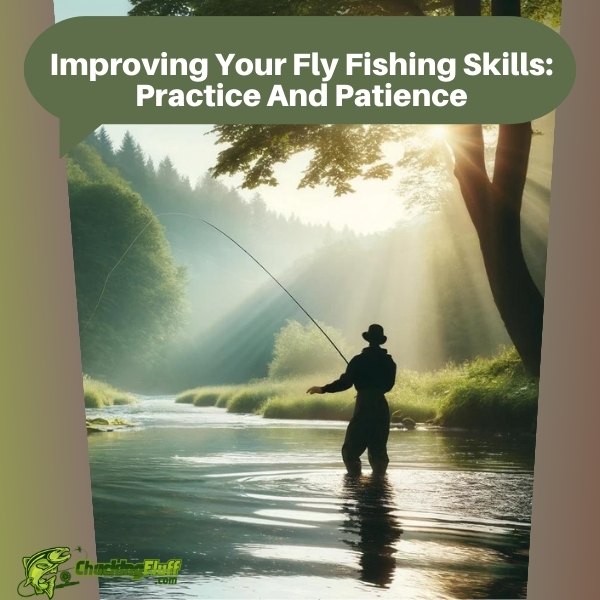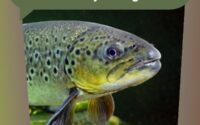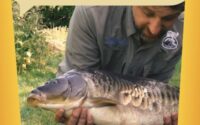| Disclosure: Just to be open and honest the buttons and links you click on in the website will in most cases take you to another website where you can purchase the products I am reviewing. As an Amazon Associate I earn from qualifying purchases. |
Improving Your Fly Fishing Skills: Practice And Patience

Fly fishing is more than just a hobby; it’s an art form that requires dedication, skill, and above all, patience. Whether you’re a novice angler or a seasoned veteran, there’s always room for improvement. In this comprehensive guide, we’ll delve into the importance of practice and patience in honing your fly fishing skills, providing practical tips, techniques, and insights to help you become a more proficient angler.
Quick Post Navigation
- Understanding Fly Fishing Basics
- The Role of Practice in Fly Fishing
- Developing Patience in Fly Fishing
- Practical Tips for Improving Your Fly Fishing Skills
- Mastering Different Fly Fishing Techniques
- Adapting to Different Fishing Conditions
- The Mental Aspect of Fly Fishing
- Conservation and Ethical Fly Fishing Practices
- Staying Safe While Fly Fishing
- Joining Fly Fishing Communities
- Resources for Further Improvement
- Case Studies: Success Stories and Lessons Learned
- Conclusion
- FAQs
- “Check out some of our other Buying Guides”
Understanding Fly Fishing Basics
Before diving into the nuances of improving your fly fishing skills, it’s essential to grasp the basics. Equip yourself with the necessary gear, including a quality fly rod, reel, line, and flies. Familiarize yourself with fundamental techniques such as casting, presentation, and fly selection.
The Role of Practice in Fly Fishing
Practice is the cornerstone of mastery in any endeavor, and fly fishing is no exception. Spend time on the water honing your casting technique, building muscle memory, and perfecting your presentation. Repetition breeds proficiency, so don’t be discouraged by initial setbacks.
Developing Patience in Fly Fishing
Patience is perhaps the most crucial attribute of a successful fly angler. Learn to read the water, understand fish behavior, and embrace the art of observation. Sometimes, the most rewarding catches come to those who wait patiently and persevere through adversity.
Practical Tips for Improving Your Fly Fishing Skills
Set achievable goals for yourself, whether it’s mastering a particular casting technique or targeting a specific species of fish. Seek guidance from experienced anglers, either through mentorship programs or online forums. Embrace technology as a tool to enhance your skills, from video tutorials to smartphone apps that track weather patterns and water conditions.
Mastering Different Fly Fishing Techniques
Diversify your skill set by mastering various fly fishing techniques, such as dry fly fishing, nymphing, and streamer fishing. Each method presents unique challenges and opportunities, allowing you to adapt to different fishing conditions and target a wide range of species.
Adapting to Different Fishing Conditions
Understanding the nuances of water temperature, clarity, and seasonal variations is essential for success in fly fishing. Learn to adapt your tactics accordingly, whether it’s adjusting your fly pattern or changing your presentation speed to entice wary fish.
The Mental Aspect of Fly Fishing
Maintaining composure and mental fortitude is crucial when facing challenging fishing situations. Stay calm under pressure, manage expectations, and learn to cope with frustration when things don’t go as planned. Remember, every missed strike or lost fish is an opportunity to learn and improve.
Conservation and Ethical Fly Fishing Practices
As stewards of the environment, it’s our responsibility to practice ethical and sustainable fly fishing techniques. Embrace catch and release practices, handle fish with care, and respect wildlife and their habitats. By preserving our natural resources, we ensure the longevity of the sport for future generations.
Staying Safe While Fly Fishing
Safety should always be a priority when venturing into the great outdoors. Dress appropriately for the weather conditions, wear protective gear, and be mindful of potential hazards such as slippery terrain and swift currents. With proper preparation and awareness, you can enjoy fly fishing safely and responsibly.
Joining Fly Fishing Communities
Engage with like-minded anglers by joining fly fishing communities, whether it’s a local club, online forum, or social media group. Networking with fellow anglers provides valuable insights, camaraderie, and opportunities to learn from others’ experiences. Don’t be afraid to ask questions and share your own knowledge and expertise.
Resources for Further Improvement
Expand your knowledge and skills through a variety of resources, including books, online courses, workshops, and seminars. Explore the wealth of information available from reputable sources, and never stop learning and growing as an angler.
Case Studies: Success Stories and Lessons Learned
Draw inspiration from real-life success stories and learn from the challenges faced by fellow anglers. Whether it’s overcoming a personal plateau or landing the catch of a lifetime, these stories serve as a testament to the power of practice, patience, and perseverance.
Conclusion
Improving your fly fishing skills is a journey that requires dedication, persistence, and a willingness to learn. By practicing regularly, exercising patience, and embracing the art of fly fishing, you’ll not only become a more proficient angler but also deepen your connection to the natural world.
FAQs
How long does it take to become proficient in fly fishing?
Becoming proficient in fly fishing varies from person to person, depending on factors such as dedication, practice, and natural aptitude. While some may progress quickly, others may take longer to hone their skills. The key is to remain patient and persistent in your pursuit of mastery.
Is it necessary to invest in expensive equipment?
While quality gear can enhance your fishing experience, it’s not necessary to break the bank when starting out. Begin with basic equipment and gradually upgrade as needed. Focus on mastering technique rather than owning the latest gadgets.
Can I learn fly fishing on my own?
While learning from experienced anglers can accelerate your progress, it’s possible to learn fly fishing on your own through books, online resources, and trial and error. Start with the basics, practice regularly, and don’t hesitate to seek guidance when needed.
What are some common mistakes beginners make?
Common mistakes beginners make include improper casting technique, using the wrong fly for the conditions, and lacking patience. Remember to start with the fundamentals, observe your surroundings, and remain patient as you develop your skills.
How can I overcome a plateau in my fly fishing skills?
Plateaus are a natural part of skill development. To overcome a plateau, try experimenting with new techniques, seek feedback from experienced anglers, and challenge yourself with new fishing scenarios. Remember, persistence and perseverance are key to continued improvement.



